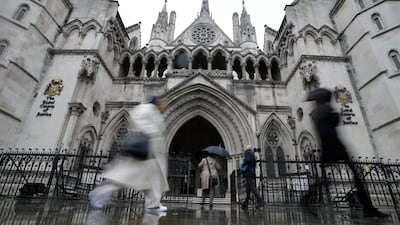Three families evacuated to the UK from Afghanistan, including two former special forces members, have lost their case against the government to house them in hotels in London.
The families had been placed in the capital as bridging accommodation following their evacuation from Kabul in the summer of 2021.
But last year, the hotel, which was housing almost 100 Afghans, served notice to terminate its contract with the government, which decided to rehouse them all 340km away in Manchester.
It led to the families taking the government to the High Court in a bid to overturn the decision and offer them accommodation in London where their children have been attending school for over a year and where some were now working.
However, Mr Justice Henshaw ruled the relocation decision is not in breach of the government's obligations and rejected their bid for a judicial review.
The court heard the Home Office had altered its policy to offer accommodation in Manchester rather than London due to the higher living costs in the capital.
“One factor of relevance has been the ability of the Afghan resettlement scheme beneficiaries to settle long term in London,” the judge said.
“The private rental market in London is generally extremely expensive, and so even with the support made available to Afghan nationals arriving under the schemes the defendant was concerned that in many cases it would be unrealistic to expect those Afghan nationals to be able to afford to settle in London in the long term.
“The strategy of exiting from London was accordingly, in part influenced by the defendant's desire to avoid Afghan nationals being located in areas which they would not, in the long term, be able to afford to settle in London in the long term.
“I consider that the defendant did balance the claimants' reasons for remaining in London against the considerations that favoured offering replacement bridging accommodation away from London, and there is no reason to believe that was other than a genuine exercise.”
The claim had involved a former member of the Afghan army, who had worked alongside British advisers in Afghanistan for 17 years in a special forces unit.
He and his partner have six children and some of them had been attending a school in Southwark. Since being moved to Manchester they have not been enrolled in a school and have been receiving remote tuition from the school in London.
Another case involved a female Afghan senior charity worker who is now working for a British organisation.
Her young daughter had been attending nursery in London and her 17-year-old cousin, who she cares for, had been attending college in Southwark.
She has now also been moved to a hotel Manchester and her child presently does not have a nursery place, her cousin remains out of education and her employer requires her to work in London.
The third claimant was a former member of the Afghan special forces who had worked alongside the British Army on drug enforcement and terrorism.
He and his partner have seven children, six of whom were attending school in London. He was enrolled on a security industry training course until the Home Office moved him to Manchester.
The court heard the government was forced to change its strategy of using London hotels due to increasing migration pressures and costs.
More than 15,000 Afghans were evacuated to UK following the Taliban's takeover in 2021.


